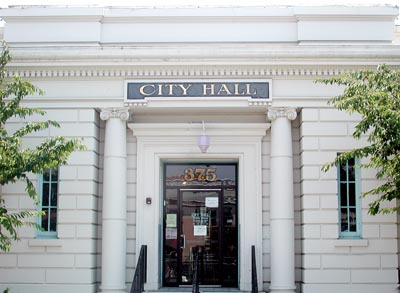Hollister council members Monday took on a goal of devising goals. And by the end of the special gathering, city officials set another goal to come back at the next regular meeting with more goals.
“That’ll be our goal is to set some goals,” Mayor Ignacio Velazquez concluded Monday night.
City Manager Bill Avera had a response.
“I would love to see wish lists,” he said.
There was plenty of goal-oriented dialogue at the special council meeting Monday at Hollister City Hall. Council members couldn’t take action, however, because the agenda item was just a discussion matter on “Budget Goals and Objectives”. Without voting, council members planned to come up with ideas for preferred, primary goals moving forward and bring those back to the next meeting.
Before that occurred, though, officials talked about implications with the expiration of the 1 percent Measure E sales tax in 2018. It generates more than $4 million in revenue for a city with a $19 million general fund budget. So if voters don’t approve an extension of some kind on a ballot later this year, the city would face drastic cuts and likely layoffs.
Council members and administrators shared views on such issues as public safety, economic development, code enforcement and payment of side-fund debt that lessens the pain on annual credit liability.
Staff officials had asked for more direction on the council’s broader goals in preparation for budget workshop talks in late April. Under the umbrella of talking over future goals, Avera offered his take in relatively direct fashion.
“All I want to do over the next year is make three of you happy,” Avera said to the five council members, drawing laughs from some city officials. “That’s my goal and my objective.”
Mayor Ignacio Velazquez responded.
“Here’s a better goal,” he said. “Let’s make 37,000 people happy.”
Velazquez during the meeting made the same push he’s made since his initial election in late 2012, that the city must plan better so it can use such special sales-tax dollars on infrastructure improvements like repairing roads. Velazquez during his first campaign four years ago talked a lot about weaning the city off the need to spend those sales tax dollars on day-to-day expenses such as employee compensation.
“Where are we at, as far as our numbers over the next couple of years?” Velazquez said to the staff.
The mayor also noted how he wanted the city to “finish what we started” with regard to discretionary spending. Over the past couple of years, the city has spent unrestricted tax dollars on such items as downtown security cameras, park improvements and donations to local nonprofits. Velazquez also mentioned wanting to restart a city newsletter that he launched in 2013 for $20,000 annually. After one edition of the newsletter, the effort halted.
Avera responded to the mayor’s sentiment.
“I’ll address the elephant in the room,” Avera said. “Everyone knows you can’t survive the way you’re surviving without Measure E.”
He asked council members if they want to make more improvements to parks and streets and “take a lump” when the tax measure goes away, or save every penny until it expires. He contended the city is operating at a “minimum level of service” now.
Avera responded to the potential for layoffs in 2018 if voters reject another tax. He mentioned the city spending “a million dollars” on cameras and “this and this,” but then trailed off that saving money could potentially buy more time in the event of a tax failure.
“Whatever the council wants to decide, those are your decisions,” he said.
As for council members sharing their initial preferences on goals, Councilman Ray Friend said he supported continuing payback of the city’s debt but also wanted to continue spending on parks and other discretionary areas. He said he gets complaints about street sweeping and expressed concern about employees leaving for other jobs.
“I think we still have to live in the city and we owe it to the people who pay taxes to do the things we’ve been doing like improve the parks,” Friend said.
Councilwoman Mickie Luna stressed the need for an emergency response plan in the event of a major earthquake and added how more of the city’s parks need help.
“In regards to the parks, we still have work to do,” she said.
Councilman Karson Klauer said he was concerned about employee flight and wanted to focus on economic development to improve the tax base.
Councilman Victor Gomez reminded officials that the special sales tax was meant to enhance city services. He said the city must strike a balance between paying down debt and providing essential services.










